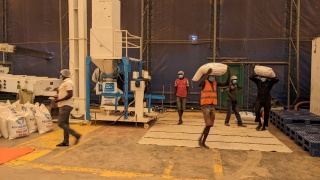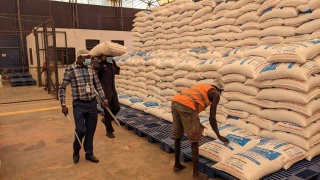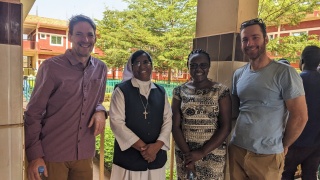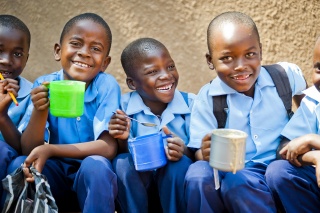
The road less travelled: the logistics of providing school meals for the world's most vulnerable children
Discover what goes on behind the scenes of our work and learn how incredible people coming together can truly bring hope to the world's poorest children.
Serving meals to children living in some of the world’s poorest communities in their place of education meets their immediate need for food, while helping to tackle a key driver of poverty – lack of education – by encouraging them to come to school and learn. But this is only part of our story.
Behind the scenes, across Africa, Asia, Latin America, the Caribbean and the Middle East there are large-scale logistics operations taking place to make it possible for Mary’s Meals volunteers to cook and serve more than 2.4 million plates, mugs and bowls of food to children every day while they attend their place of learning. Our purpose to bring light to the lives of the most vulnerable children takes us into some dark situations, and we have honed our approach to school feeding over more than two decades, working with communities, schools and specialist partners to ensure we can serve children in some of the hardest-to reach and most challenging places on earth. Whether it be volunteers, staff members, partner organisations, supporters or fundraisers, our movement is made up of individuals who align with our vision and share our belief that no child should endure this world of plenty without a meal. Without them, none of it would be possible.

From field to plate: a feat of planning and coordination The journey of a meal starts with our suppliers: organisations that distribute ingredients on our behalf and keep our supply chain safe and running to schedule. Antonio Longo, Head of Programme Operations at Mary’s Meals International, explains some of the key features of Mary’s Meals’ approach to logistics, such as the fact we assign groups of schools to each supplier, who then organise appropriate shipments of food in line with the quantities of ingredients needed. He says, in certain countries, such as Zambia, suppliers set up warehouses in different locations to aid with transportation and minimise disruption. In doing so, they can create efficiencies by making more short-distance deliveries in areas where we are working with a high number of schools. In Malawi, food is delivered directly from the supplier’s main location to the schools to be offloaded and sorted by volunteers while in Kenya and Liberia, suppliers operate from a warehouse. Whenever deliveries arrive at a place of education that is part of our programme, a Mary’s Meals representative will conduct rigorous checks to ensure orders are both correct and of the high standard we expect.
The ingredients we use in our meals are sourced locally wherever possible and differ depending on local tastes, culture and availability. A key characteristic of our work is long-term commitment to the communities we serve and it is essential that our daily meals use ingredients that are reliably available, simple to prepare and cost effective.
We often say that our school feeding programme is owned and run by local communities, and what we mean is that we work together within an agreement that if the local community agrees to participate in, nurture and sustain the programme, we will continue to provide the necessary ingredients, training, monitoring and support until the time comes that we are no longer needed. In a similar way, if suppliers deliver to a consistently high standard, we will continue working with them year after year. We have found that this assurance has positive outcomes for both ends of the supply chain: we receive high quality produce, and suppliers and local farmers have the confidence to invest in farming methods and infrastructure to ensure supplies are delivered smoothly and of the highest quality.

Navigating challenging environments
Malawi
Delivery is not always a straightforward process, and our teams must prioritise forward planning to ensure that food reaches each place of education we serve in a timely manner, even in the most trying circumstances. In Malawi, where our meals were first served to children more than 20 years ago, around 30% of the schools we reach are located in hard to-reach areas. When suppliers can't access the most isolated locations, the Mary’s Meals Malawi team is on hand to transport deliveries by motorbike or truck wherever required. With the ever-growing threat of climate disasters, such as severe flooding, drought and deadly cyclones, our teams place larger orders with suppliers for the hardest-to-reach areas during rainy seasons. This means that supplies can be in reserve for long periods, so it is essential that we avoid any spoilage, especially in humid climates, and a lot of time and effort goes into stock management (stacking, rotating etc) to keep food safe.
South Sudan
Our programme in South Sudan is delivered by two partners, the Diocese of Rumbek and Mary Help Association (MHA), in more than 150 schools. Known as ‘the world’s youngest nation’ after gaining independence from Sudan in 2011, the country has been mired in conflict for many years and remains a complex landscape. Factors such as economic stagnation, poverty and a reliance on imports exacerbate cripplingly high levels of food insecurity, so, to ensure we can fulfil our promise to the children of South Sudan, most of our food must be sourced from neighbouring countries such as Uganda. There is a painstaking process involved in arranging these deliveries, as we must navigate hazardous road conditions and security threats including the high risk of hijacking.
PG3 Logistics is our South Sudanese supplier that provides more than 2,000 metric tonnes of food per year to The Diocese of Rumbek. With such a high volume of food needed and a treacherous journey required to get it where it needs to be, Mary’s Meals organises for food reserves to be stored at a warehouse in Rumbek to ensure food is available at all times throughout the academic year.
Our partner MHA serves our meals to more than 11,000 children living in extremely remote areas and in some cases has reopened or rebuilt schools and roads to help reach those young children in danger of being forgotten by the outside world. Mary’s Meals knowing where these extremely vulnerable children are and how to help them would be incredibly challenging were it not for the expertise of MHA and, together, we are helping to strengthen communities and offer much-needed support to the next generation. It is thanks to meticulous planning and iron-tight partnerships that we remain one of few organisations providing reliable and consistent school feeding in the country.
It all starts with partnership
School buildings and ‘places of education’ come in all different shapes and sizes across the 18 countries where our meals are served; classrooms can range from purpose-built concrete rooms to a patch of ground shaded by a tree. When a place of learning becomes part of our school feeding programme, our first requirement is that they can provide a safe, hygienic and properly equipped cooking space where school meals can be prepared. The construction of kitchens and storerooms is managed by the community, and they use whatever building resources are available to them. This means the spaces where our meals are cooked, and supplies are stored, can also differ greatly. More often than not, kitchens are located on school property, but this is not possible in certain contexts. In Syria, for example, our meals are cooked in a central location and distributed to schools by volunteers. We serve meals to more than 5,000 children across Aleppo, in 17 schools and one community centre, but the meals are prepared by volunteers in one school that has reliable access to water and electricity.
Equal partnership is fundamental to our programme; we ask that schools and communities contribute as much as possible, and we provide ingredients, training, monitoring and unwavering support every step of the way. We train volunteer cooks (many of whom are mothers, grandmothers or other relatives of the children) on how to prepare the meals as well as portion sizes, hygiene practices, child safety and serving methods. Volunteers tasked with the essential job of overseeing the storage and security of supplies also receive training on stock control, mealtimes and data management.

Remarkable people making the unexpected possible
Throughout our history, we have been blessed by incredible individuals who go above and beyond to contribute to the running of our school feeding programme and help to make it a success. To serve children living on the islands of Likoma and Chizumulu (located 40 miles from the Malawi mainland) we must use boats to bring all that is needed to prepare and cook the delicious mugs of porridge. When the boats arrive at each of the islands, people from the local communities will make their way to the port to collect the bags of grain and supplies and deliver them to the schools where volunteers can turn them into tasty meals.
In Liberia, our team was once forced to decline a request for Mary’s Meals because there was no feasible way for them to transport supplies to and from the school. The community clubbed together and a few weeks later, the Mary’s Meals team returned to a newly constructed concrete bridge towering over the once impassable river to the main road.
In the Central Plateau region of Haiti, community volunteers carry bags of ingredients across three hills using trusty donkeys to transport the food to ensure Mary’s Meals can be served to children at Ecole Communautaire Saint Michel de Morne Mouton. This extremely remote place of education was founded more than 30 years ago by a man who had to drop out of school early to help his family farm the fields. He donated a section of his land at the top of the mountain to make way for the school’s construction all those years ago, and then attended the school himself to gain the education he missed out on at such a young age. Today, as the school’s principal, he and our partner organisation, Summits Education, serve more than 200 primary school learners every school day.
At Mary’s Meals we are firm believers in the innate goodness of people and committed to being good stewards of the gifts people entrust to us. While we face many challenges in our work to provide daily meals to more than 2.4 million vulnerable children every school day, we are continually spurred on by the unerring support, compassion and commitment of a global family. The sum total of many moving parts and small acts are bringing about big changes for the children and communities who rely on our school feeding programme.
